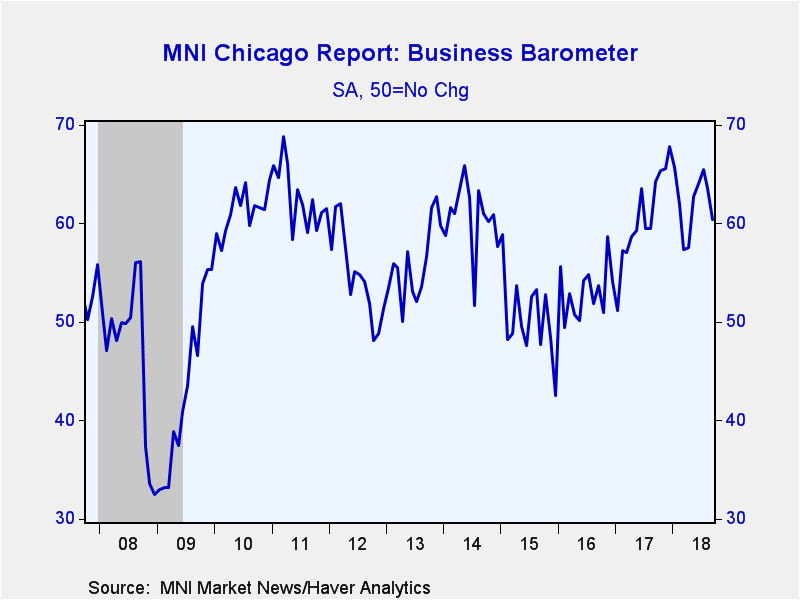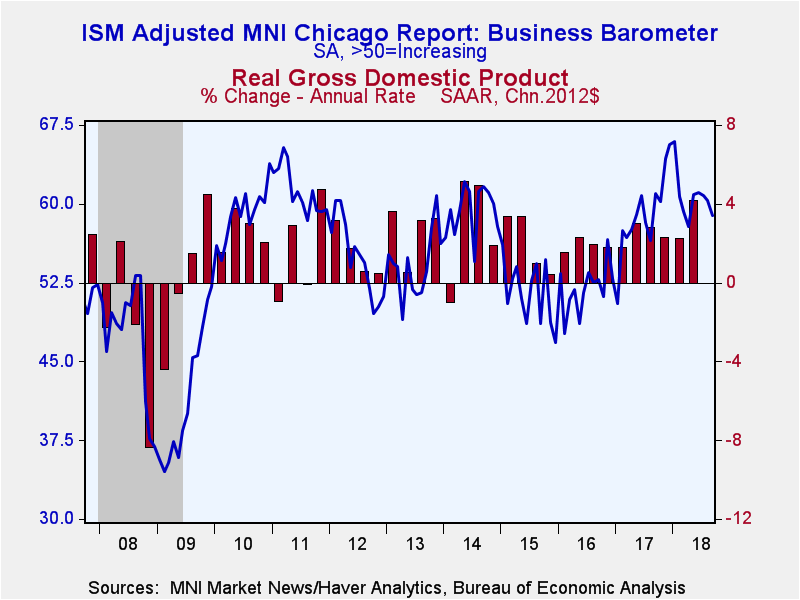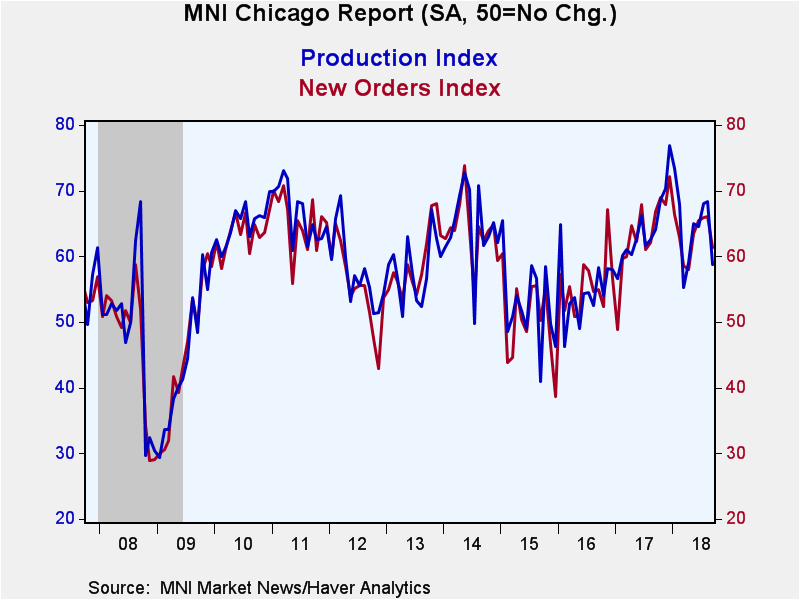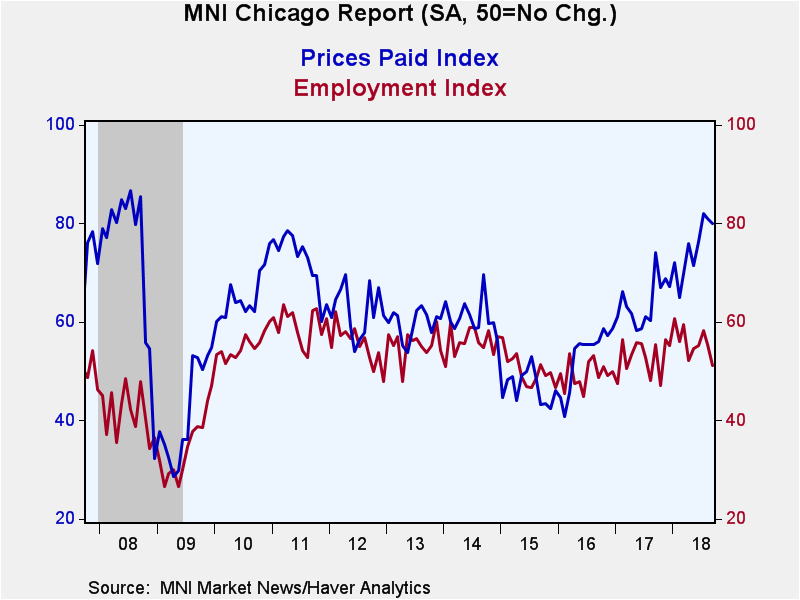 Global| Sep 28 2018
Global| Sep 28 2018Chicago Business Barometer Falls and Prices Paid Index Eases
Summary
The Chicago Purchasing Managers Business Barometer fell for the second consecutive month to 60.4 in September from 63.6 in August. The Action Economics Forecast Survey expected a decline to 62.0. The Chicago Purchasing Managers [...]
The Chicago Purchasing Managers Business Barometer fell for the second consecutive month to 60.4 in September from 63.6 in August. The Action Economics Forecast Survey expected a decline to 62.0. The Chicago Purchasing Managers figures are diffusion indexes with readings above 50 indicate growth. Haver Analytics constructs an ISM-Adjusted index with similar methodology as the ISM Composite Index. This index weakened to 58.9 from 60.3. During the last ten years, there has been a 60% correlation between the index level and the quarter-on-quarter change in real GDP.
The production and new orders indexes declined, with production falling to a six-month low. Meanwhile, the order backlog measure increased and the supplier delivery index reversed some of August's decline. The inventory index jumped to its highest level since the beginning of the year.
The employment index fell to its lowest level since October 2017, but at 51.1 remained above the break-even level of 50. During the last ten years, there has been an 81% correlation between the index level and the month-to-month change in factory sector payrolls. Twenty percent of survey respondents reported higher payroll levels while 18% indicated a decline, though these responses are not adjusted for seasonal variation (NSA).
The index of prices paid declined for the second consecutive month to 79.9, but remains near July's 10-year high reading of 82.1. Fifty-four percent of respondents reported higher prices (down from 64% in July), while just two percent reported price declines, though these figures are NSA.
The MNI Chicago Report is produced by MNI in partnership with ISM-Chicago. The survey covers a sample of over 200 purchasing professionals in the Chicago area with a monthly response rate of about 50%. Summary data are contained in Haver's USECON database, with detail including the ISM-style index in the SURVEYS database. The Action Economics Forecast Survey is available in AS1REPNA.
| Chicago Purchasing Managers Index (%, SA) | Sep | Aug | Jul | Sep '17 | 2017 | 2016 | 2015 |
|---|---|---|---|---|---|---|---|
| General Business Barometer | 60.4 | 63.6 | 65.5 | 64.3 | 60.8 | 53.1 | 50.3 |
| ISM-Adjusted General Business Barometer | 58.9 | 60.3 | 60.8 | 61.0 | 59.0 | 52.0 | 51.6 |
| Production | 58.8 | 68.3 | 68.1 | 64.1 | 64.3 | 54.7 | 52.5 |
| New Orders | 61.4 | 66.1 | 65.9 | 66.9 | 63.5 | 55.7 | 50.4 |
| Order Backlogs | 61.9 | 59.0 | 65.3 | 63.4 | 55.2 | 47.2 | 44.4 |
| Inventories | 60.6 | 50.5 | 45.3 | 56.8 | 54.9 | 47.2 | 52.1 |
| Employment | 51.1 | 55.4 | 58.3 | 55.4 | 52.9 | 49.4 | 50.3 |
| Supplier Deliveries | 62.5 | 61.0 | 66.6 | 61.9 | 59.4 | 52.8 | 52.6 |
| Prices Paid | 79.9 | 81.0 | 82.1 | 74.1 | 64.0 | 53.2 | 46.8 |
Gerald D. Cohen
AuthorMore in Author Profile »Gerald Cohen provides strategic vision and leadership of the translational economic research and policy initiatives at the Kenan Institute of Private Enterprise.
He has worked in both the public and private sectors focusing on the intersection between financial markets and economic fundamentals. He was a Senior Economist at Haver Analytics from January 2019 to February 2021. During the Obama Administration Gerald was Deputy Assistant Secretary for Macroeconomic Analysis at the U.S. Department of Treasury where he helped formulate and evaluate the impact of policy proposals on the U.S. economy. Prior to Treasury, he co-managed a global macro fund at Ziff Brothers Investments.
Gerald holds a bachelor’s of science from the Massachusetts Institute of Technology and a Ph.D. in Economics from Harvard University and is a contributing author to 30-Second Money as well as a co-author of Political Cycles and the Macroeconomy.









